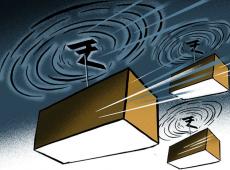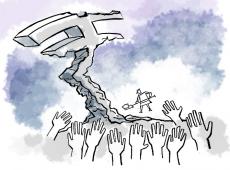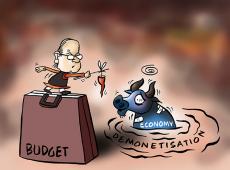Fiscal Space Crucial for Growth: Former President Kovind
By Rediff Money Desk, NEWDELHI Apr 06, 2024 22:03
Former President Ram Nath Kovind emphasizes the importance of fiscal space for economic growth. He highlights the role of sound fiscal management and tax reforms in attracting investment and boosting India's trajectory.

New Delhi, Apr 6 (PTI) Creating adequate fiscal space is important to give impetus to the current growth trajectory, said former President Ram Nath Kovind on Saturday.
Speaking at an event organised by TIOL here, the former president said no nation can prosper without predictability and certainty in the tax architecture.
The fiscal architecture is one of its most important pillars, he said.
Sound fiscal management attracts both public and private capital and improves the quality of the public-private partnership.
"Over the years, we have made great progress in streamlining our taxation policy. The complex tax regimes themselves have been simplified beyond recognition" he said.
Now there are fewer tax slabs, processes have been streamlined. taxation policy has become more predictable and investor confidence improved while ease of doing business has enhanced, he said.
All this has been made possible by leveraging technology and going forward faceless tax assessment will be the norm, he said.
Speaking at the event former Finance Commission Chairman N K Singh said that one cannot talk of fiscal deficit without considering revenue buoyancy. "There is a symbiotic relationship to taxes, tax reform and enhanced rates of economic growth," he said.
Singh further said that investor decisions influenced by rating agencies do not look at designated debt, but the government debt, which concerns the states and the centre.
"This would suggest that the global average debt post-pandemic now approaches 100 per cent. It is projected to remain above pandemic levels for about half the world," he said, while asking what kind of debt numbers and new principles would incentivize growth," he said.
He also said that the philosophy of fiscal deficits in India is of recent origin, which earlier were budget deficits.
The adoption of the Sukhamoy Chakravarty Report in 1982, which recommended fiscal deficit for the purpose of reporting, periods of fiscal profligacy invariably resulted in India seeking accommodation from multilateral and bilateral entities, he said.
"The fact that growth remained modest contributed to fiscal pressures. Opting to inflate debt in other countries brought other serious growth consequences," he added.
Speaking at an event organised by TIOL here, the former president said no nation can prosper without predictability and certainty in the tax architecture.
The fiscal architecture is one of its most important pillars, he said.
Sound fiscal management attracts both public and private capital and improves the quality of the public-private partnership.
"Over the years, we have made great progress in streamlining our taxation policy. The complex tax regimes themselves have been simplified beyond recognition" he said.
Now there are fewer tax slabs, processes have been streamlined. taxation policy has become more predictable and investor confidence improved while ease of doing business has enhanced, he said.
All this has been made possible by leveraging technology and going forward faceless tax assessment will be the norm, he said.
Speaking at the event former Finance Commission Chairman N K Singh said that one cannot talk of fiscal deficit without considering revenue buoyancy. "There is a symbiotic relationship to taxes, tax reform and enhanced rates of economic growth," he said.
Singh further said that investor decisions influenced by rating agencies do not look at designated debt, but the government debt, which concerns the states and the centre.
"This would suggest that the global average debt post-pandemic now approaches 100 per cent. It is projected to remain above pandemic levels for about half the world," he said, while asking what kind of debt numbers and new principles would incentivize growth," he said.
He also said that the philosophy of fiscal deficits in India is of recent origin, which earlier were budget deficits.
The adoption of the Sukhamoy Chakravarty Report in 1982, which recommended fiscal deficit for the purpose of reporting, periods of fiscal profligacy invariably resulted in India seeking accommodation from multilateral and bilateral entities, he said.
"The fact that growth remained modest contributed to fiscal pressures. Opting to inflate debt in other countries brought other serious growth consequences," he added.
Read More On:
DISCLAIMER - This article is from a syndicated feed. The original source is responsible for accuracy, views & content ownership. Views expressed may not reflect those of rediff.com India Limited.
You May Like To Read
TODAY'S MOST TRADED COMPANIES
- Company Name
- Price
- Volume
- GTL Infrastructure
- 2.93 ( -4.87)
- 226206286
- IFL Enterprises
- 1.30 (+ 4.84)
- 81461564
- Vodafone Idea L
- 16.79 (+ 0.66)
- 67447398
- NCL Research
- 0.95 ( -4.04)
- 31996628
- Franklin Industries
- 3.73 (+ 3.32)
- 21511209
MORE NEWS

Navi Mumbai Airport ILS Signal Testing Begins
The Airports Authority of India (AAI) has begun ILS signal testing at the...

Air India VRS for Non-Flying Staff Ahead of...
Air India has announced a voluntary retirement scheme (VRS) and voluntary separation...
Fisher Groups Oppose WTO Fisheries Subsidy Talks
Small-scale fisher groups from India, Indonesia, and Bangladesh demand WTO keep...












 © 2024 Rediff.com India Limited. All rights reserved.
© 2024 Rediff.com India Limited. All rights reserved.